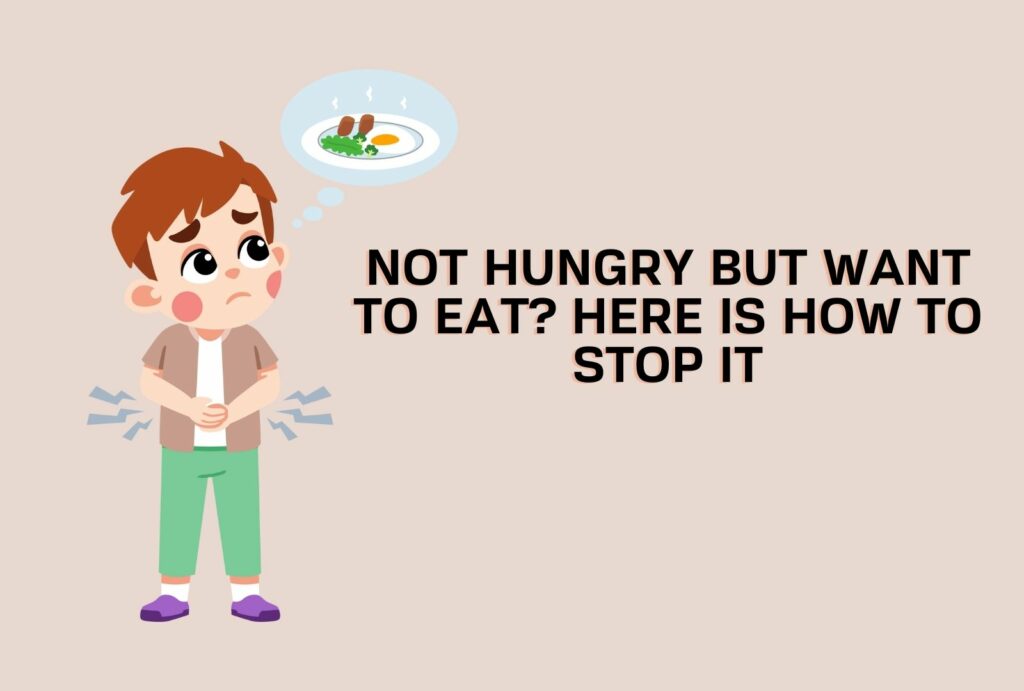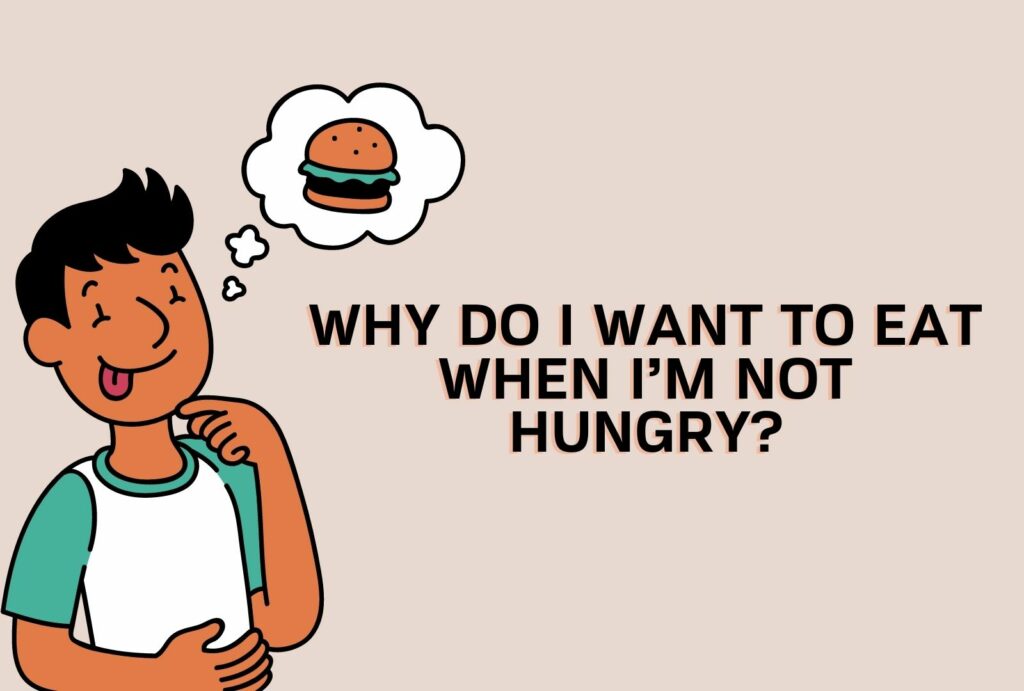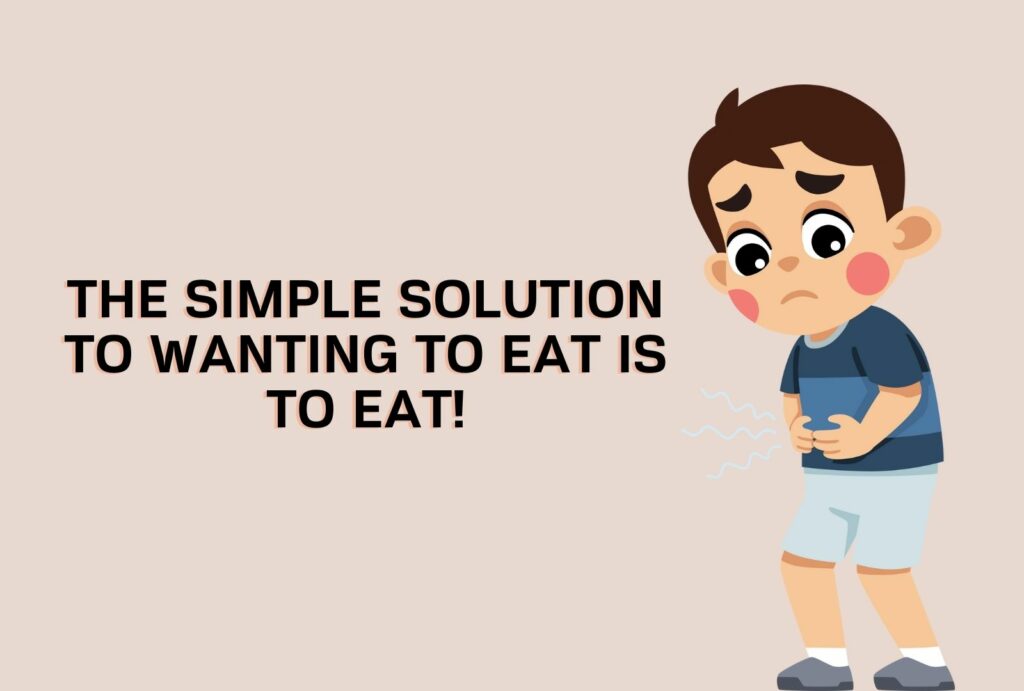
Many of us have experienced the feeling of not being hungry but still wanting to eat something. This can be due to various reasons, such as boredom, stress, or even habit. However, overeating or indulging in unnecessary snacks can lead to weight gain and other health issues. Therefore, it’s essential to learn how to stop this urge to eat when not hungry.
Recognize the difference
Firstly, it’s crucial to recognize the difference between physical hunger and emotional hunger. Physical hunger is a signal from your body that it needs nourishment, while emotional hunger is driven by emotions and feelings rather than actual hunger. So, before reaching for a snack, ask yourself if you’re physically hungry or if you’re using food to deal with emotions.
Plan
Another way to combat the urge to eat when not hungry is to plan your meals and snacks in advance. Make a schedule for your meals and stick to it, ensuring you’re consuming enough calories and nutrients to keep your body satisfied. This can help prevent sudden cravings and impulsive eating, which often lead to overeating.
Staying hydrated
Additionally, staying hydrated is essential for controlling the urge to eat when not hungry. Sometimes, thirst can be mistaken for hunger. Therefore, keep a water bottle with you and drink enough water throughout the day. This will not only help quench your thirst but also help you avoid unnecessary snacking.
Furthermore, practicing mindfulness can be an effective way to stop the urge to eat when not hungry. Pay attention to your thoughts and emotions and be present in the moment. This will help you identify the triggers that make you want to eat, and you can then find alternative ways to deal with those triggers, such as going for a walk or doing some breathing exercises.
In conclusion, not being hungry but still wanting to eat is a common experience for many people. However, it’s essential to learn how to control this urge and make healthier choices for our bodies. By differentiating physical and emotional hunger, planning meals and snacks, staying hydrated, and practicing mindfulness, we can overcome the urge to eat when not hungry and maintain a healthy lifestyle.
Why Do I Want to Eat When I’m Not Hungry?

Have you ever found yourself reaching for a snack even though you’re not hungry? You’re not alone. The desire to eat when not hungry is a common experience that can be caused by several factors. In this article, we will explore some reasons why we want to eat when we’re not hungry.
Emotional reasons
One reason we may want to eat when not hungry is due to emotional reasons. Eating can be a form of emotional comfort or distraction from negative emotions such as stress, anxiety, or boredom. We might also associate food with happy memories, making us crave certain foods, even when we’re not physically hungry.
Habit
Another reason for wanting to eat when not hungry is due to a habit. Our bodies can become accustomed to certain eating patterns, such as snacking in front of the TV or reaching for a sugary treat after dinner. These habits can create an association between food and certain situations or emotions, causing us to crave food, even when we’re not physically hungry.
Body’s natural rhythms
Furthermore, our body’s natural rhythms can affect our desire to eat. For example, hormonal changes during the menstrual cycle can cause an increase in appetite, leading to cravings for specific foods, even when we’re not physically hungry. Additionally, lack of sleep can disrupt our body’s natural hunger signals, making us crave more food than we need.
Dehydration
Moreover, sometimes our desire to eat when not hungry can be caused by dehydration. Our bodies can mistake thirst for hunger, causing us to crave food when we’re actually just thirsty. Therefore, it’s essential to stay hydrated throughout the day to prevent unnecessary snacking.
In conclusion, wanting to eat when not hungry is a common experience that can be caused by various factors such as emotions, habits, hormonal changes, or dehydration. However, it’s essential to recognize the reasons behind our cravings to prevent overeating or indulging in unhealthy snacks. By addressing the root cause of our desire to eat, we can make healthier choices for our bodies and maintain a balanced lifestyle.
How to Stop Eating When You’re Not Hungry
Eating when you’re not hungry can be a challenging habit to break. However, it’s essential to learn how to stop this behavior to maintain a healthy lifestyle. In this article, we will explore some tips on how to stop eating when you’re not hungry.
The first step to stop eating when you’re not hungry is to identify the triggers that lead to this behavior. It could be due to emotional reasons, such as stress or boredom, or due to environmental factors such as having easy access to food. Once you identify the triggers, you can take steps to avoid or cope with them.
Mindful eating
Another way to stop eating when not hungry is to practice mindful eating. This means paying attention to your body’s hunger signals and being present in the moment while eating. Before eating, ask yourself if you’re physically hungry or if you’re using food to deal with emotions. If you’re not physically hungry, try to find alternative ways to cope with your emotions.
Prevent impulsive eating
Moreover, it’s essential to plan your meals and snacks in advance to prevent impulsive eating. Make a schedule for your meals and stick to it, ensuring you’re consuming enough calories and nutrients to keep your body satisfied. Also, keep healthy snacks on hand for when you do feel hungry, so you’re less likely to reach for unhealthy options when not hungry.
Staying hydrated
Furthermore, staying hydrated can help prevent overeating when not hungry. Drink enough water throughout the day to prevent thirst from being mistaken for hunger. This will not only help you avoid unnecessary snacking but also improve your overall health.
Additionally, get enough sleep to regulate your body’s natural hunger signals. Lack of sleep can disrupt our body’s natural hunger signals, making us crave more food than we need. Therefore, ensure you’re getting enough rest to prevent overeating when not hungry.
In conclusion, stopping eating when not hungry can be challenging, but it’s essential for maintaining a healthy lifestyle. By identifying triggers, practicing mindful eating, planning meals and snacks, staying hydrated, and getting enough sleep, we can overcome the urge to eat when not hungry and make healthier choices for our bodies.
The Simple Solution to Wanting to Eat Is to Eat!

The desire to eat when not hungry can be a confusing experience. While it may seem counterintuitive, the simple solution to wanting to eat is to eat. However, it’s crucial to make healthy choices and listen to our body’s hunger signals. In this article, we will explore how to satisfy our cravings without overeating.
One way to satisfy our cravings when not hungry is to opt for healthy, low-calorie options. For example, if you’re craving something sweet, reach for a piece of fruit or a small serving of dark chocolate. These options can provide the sweetness you crave without overindulging in high-calorie snacks.
Moreover, if you’re craving something savory, opt for healthy snacks such as air-popped popcorn, roasted nuts, or hummus and vegetables. These options can help you feel full and satisfied without consuming excessive calories.
Another way to satisfy our cravings is to make a conscious effort to slow down and enjoy our food. Take time to savor each bite and appreciate the flavors and textures of your food. Eating slowly can help you feel more satisfied and prevent overeating.
Furthermore, it’s essential to pay attention to our body’s hunger signals. If you’re not physically hungry, try to find alternative ways to cope with your emotions or stress. For example, take a walk, meditate, or talk to a friend. By addressing the root cause of our cravings, we can prevent overeating and make healthier choices for our bodies.
In conclusion, the simple solution to wanting to eat is to eat, but it’s essential to make healthy choices and listen to our body’s hunger signals. By opting for healthy, low-calorie options, slowing down and savoring our food, and paying attention to our body’s signals, we can satisfy our cravings without overeating. It’s crucial to find a balance that works for our bodies and to make conscious decisions that support our health and wellbeing.
Consult With a Doctor If You Constantly Feel Hungry After A Meal
It’s normal to feel hungry between meals, but if you constantly feel hungry after eating, it could be a sign of an underlying health issue. In such cases, it’s essential to consult with a doctor to identify the root cause of the problem. In this article, we will explore why you might feel hungry after a meal and when to consult with a doctor.
Consuming enough calories or nutrients
One of the common reasons for feeling hungry after a meal is not consuming enough calories or nutrients. If your meals are not balanced or you’re not consuming enough food, your body may not feel satisfied, and you may experience hunger pangs. In such cases, increasing the portion sizes or adding more nutrient-dense foods can help alleviate the problem.
Rapid digestion
Another reason you might feel hungry after a meal is due to rapid digestion. If you’re consuming high-sugar or high-carb meals, your blood sugar levels may spike and then rapidly drop, leading to feelings of hunger. In such cases, opting for more balanced meals with healthy fats, protein, and fiber can help stabilize blood sugar levels and prevent hunger.
Moreover, some medications and health conditions can also lead to increased hunger. For example, medications such as corticosteroids and antidepressants can stimulate appetite, and conditions such as hypothyroidism and diabetes can affect metabolism and hunger. In such cases, it’s crucial to consult with a doctor to identify the underlying cause and develop an appropriate treatment plan.
Furthermore, if you constantly feel hungry after eating, it could be a sign of an eating disorder such as binge eating disorder. Such disorders require professional medical and mental health support to address and overcome.
In conclusion, feeling hungry after a meal could be a sign of an underlying health issue, medication side effect, or eating disorder. If you’re constantly experiencing hunger pangs after eating, it’s essential to consult with a doctor to identify the root cause of the problem and develop an appropriate treatment plan. Don’t ignore this issue as it could negatively impact your physical and mental health in the long run.
Final Words
In conclusion, it’s common to feel cravings and desire to eat when we are not hungry. It can be a result of emotional stress, boredom, lack of sleep, or other factors that impact our appetite. However, it’s crucial to make healthy choices and listen to our body’s hunger signals to avoid overeating.
One of the keys to preventing overeating is to practice mindfulness while eating. Eating slowly, savoring each bite, and paying attention to our body’s signals can help us feel more satisfied and prevent overeating. It’s also important to make healthy choices, such as opting for low-calorie snacks, and finding alternative ways to cope with our emotions.
Moreover, it’s essential to address any underlying health issues or medical conditions that may contribute to increased hunger. Consulting with a doctor and following a proper treatment plan can help alleviate the problem and improve overall health and wellbeing.
Additionally, it’s important to remember that food is not the only source of comfort or pleasure in our lives. Engaging in physical activity, spending time with loved ones, or pursuing hobbies can provide the same level of satisfaction and enjoyment.
Finally, it’s essential to find a balance that works for our bodies and to make conscious decisions that support our health and wellbeing. By being mindful of our eating habits, addressing any underlying issues, and finding alternative ways to cope with our emotions, we can satisfy our cravings without overeating and lead a healthier, more fulfilling life.
In summary, feeling cravings and wanting to eat when we are not hungry is a common experience. However, by practicing mindfulness, making healthy choices, addressing underlying issues, and finding alternative ways to cope with our emotions, we can prevent overeating and improve our physical and mental health. Remember, food is not the only source of comfort or pleasure in our lives, and finding a balance that works for our bodies is crucial to our overall wellbeing.